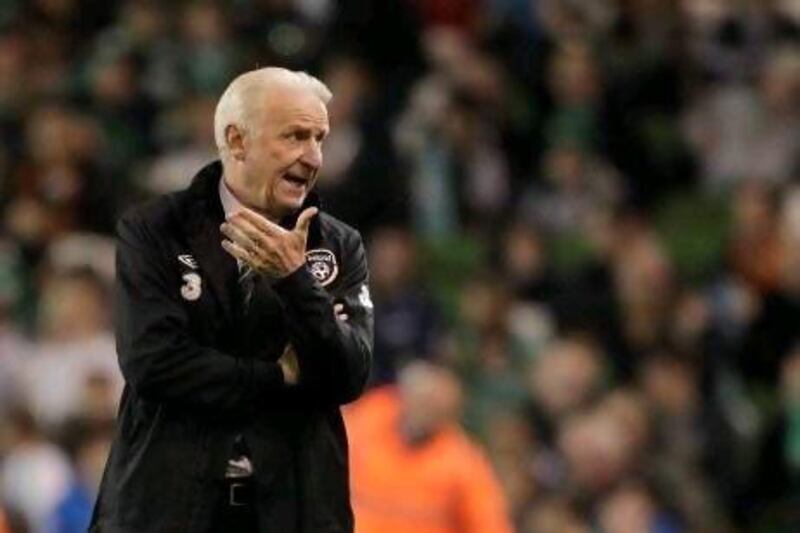A wet and windy outpost at an extremity of Europe, buffeted by the Atlantic Ocean, houses a minnow of international football. Theirs is a side that are brushed aside by the game's giants.
Enough about the Republic of Ireland, however: the Faroe Islands host Giovanni Trapattoni's side tonight.
It is a cheap jibe. More to the point, it would have been an utterly inaccurate one a few months ago when the obdurate, awkward Irish were among Europe's most resolute sides. Not now. Not after a swift, stark decline.
If the Faroes are associated with cricket or rugby scores on the football field, the Irish provided the numbers more associated with the tennis court on Friday night: 6-1, the eventual measure of a German demolition job in Dublin.
Afterwards, Trapattoni acknowledged he could not remember a 6-1 home defeat before. It raised parallels with the October afternoon last year when a stunned Sir Alex Ferguson reflected upon the same, shocking scoreline in an extraordinary Manchester derby. Each suddenly looked his age.
But there is a difference between the two septuagenarians. Ferguson immediately sought, and got, a response. Trapattoni has resisted the passing of time for years but now seems yesterday's man. The Manchester United manager retained his iron grip. His Ireland counterpart may have lost his aura. The generation gap appears to have caught up with a man who was born before the Second World War began.
Among other things, Friday was notable because it was Ireland's first competitive game since 1997 not to feature any of Robbie Keane and Richard Dunne, who were injured, and Shay Given and Damien Duff, both now retired from international football.
They were the cornerstones of Trapattoni's team, the one he rendered fiendishly hard to beat.
Having visited Italy, France and Russia, they have still never lost an away qualifier under the 73 year old.
They entered Euro 2012 unbeaten in 14 games. And then decay set in fast: for the side's senior citizens, who endured a miserable tournament as Ireland lost all three games, and for the manager himself.
Minus Given and Duff, with Keane, Dunne and John O'Shea in their footballing dotage, this was always going to be a rebuilding job.
It is one Trapattoni looks ill-equipped for. He had surrounded his marquee players with more limited talents that he valued for their industry and organisation. Continuity bred understanding; it also turned the Ireland team into a closed shop. Among those locked out were the players who could form their future.
In other circumstances, the team would be constructed around them now. Instead, Trapattoni persists with his honest but uninspiring yeomen, players from England's second tier such as Keith Andrews and Stephen Ward.
The younger group who should comprise the core of the side have been ignored, overlooked and, in some cases, alienated. While Wigan Athletic's James McCarthy and Everton's Seamus Coleman started against Germany, their opportunities have been few and far between.
The perennial substitutes Shane Long, Darron Gibson, James McClean and Ciaran Clark are all Premier League regulars but strangers to the Ireland starting line-up.
Their progress at club level has not been recognised by a manager distanced, literally and metaphorically, from the up-and-coming players. It is at times like this that one of Trapattoni's traits - managing Ireland from a base in Milan - stops being endearing and irritates increasingly. So do others: his loyalty to lesser lights, his difficulties communicating in his pidgin English and his reluctance to change.
Now change is needed: the removal of Trapattoni. The question is posed both ways - can Ireland afford to dismiss a manager on a £1.5 million (Dh8.8m) annual salary? Can they afford not to? - when, in one respect, the group has proceeded as most anticipated.
They have beaten Kazakhstan, albeit very fortunately, and lost to Germany, albeit embarrassingly. Assuming Joachim Low's side win the group, Ireland's chances of reaching the play-offs hinge, as they always did, on the two games against Sweden.
Viewed in this context, Trapattoni is a victim of his success: Ireland have only qualified for one of the last five, and two of the last nine, international tournaments. Expectation has been elevated, partly by the presence of the most decorated manager in the history of Serie A.
A track record is a manager's insurance policy but league titles won a decade or more before McClean and co were born have a decreasing relevance. The past is another country for Ireland and the high priest of catenaccio: they have to evolve and he cannot.
And so a managerial career that has taken in AC and Inter Milan, Juventus and Fiorentina, Bayern Munich and Benfica besides Italy and Ireland could conclude tonight, in the footballing backwater of Torshavn.
Should this be his farewell, it will be an undignified end for one of the greats. It would have been better, though, had he retired in the summer. Because even Giovanni Trapattoni is now powerless to halt the march of time.
Follow us
[ @SprtNationalUAE ]






